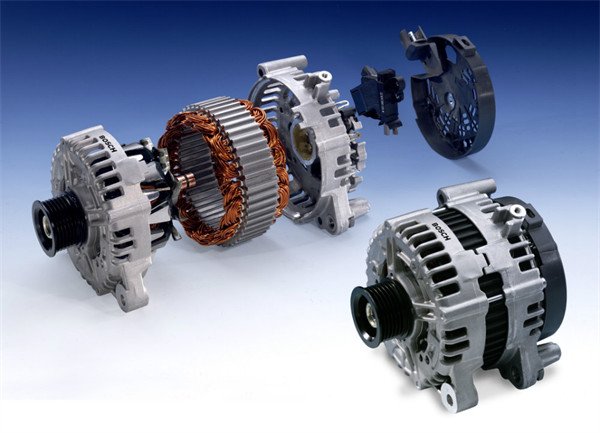Your vehicle’s electrical system relies on a crucial component—the alternator. Without it, your car’s battery would drain quickly, leaving you stranded. In this guide, we’ll explain what an alternator does, how it works, and why it’s essential for your vehicle’s operation.
What Is an Alternator?
An alternator is a generator that converts mechanical energy from the engine into electrical energy to power your car’s electrical systems and recharge the battery. Unlike older DC generators, modern alternators produce alternating current (AC), which is then converted to direct current (DC) for use in your vehicle.
Key Components of an Alternator:
- Stator & Rotor – Generate electricity through electromagnetic induction.
- Diode Rectifier – Converts AC to DC for battery and electrical systems.
- Voltage Regulator – Maintains a steady voltage (typically 13.5–14.5V) to prevent overcharging.
- Cooling Fan & Housing – Prevents overheating during operation.
Shop High-Quality Alternators (Internal link to: https://degparts.com/product-category/alternator/)
How Does an Alternator Work?
- Engine Power Turns the Alternator – The serpentine belt spins the alternator pulley.
- Magnetic Field Generation – The rotor creates a rotating magnetic field inside the stator.
- Electricity Production – The stator coils produce AC voltage.
- Conversion to DC Power – The diode rectifier changes AC to DC for the battery and electronics.
- Voltage Regulation – The voltage regulator ensures stable power output.
Without a functioning alternator, your car’s battery would die within 30-60 minutes of driving.
Why Your Vehicle Needs an Alternator
- Keeps the Battery Charged – Powers the vehicle while driving and recharges the battery.
- Supports Electrical Systems – Runs lights, radio, AC, power windows, and ECU.
- Prevents Breakdowns – A failing alternator can cause stalling or a dead battery.
- Improves Fuel Efficiency – Modern alternators adjust output to reduce engine load.
Signs of a Failing Alternator:
🔧 Dim or flickering headlights
🔧 Battery warning light on dashboard
🔧 Strange noises (whining, grinding)
🔧 Electrical failures (radio, power windows)
🔧 Engine stalling or difficulty starting
If you notice these symptoms, inspect your alternator or find a replacement here: https://degparts.com/product-category/alternator/
Alternator Maintenance Tips
✅ Check belt tension – A loose belt can reduce charging efficiency.
✅ Test battery voltage – Should read 12.6V (off) and 13.5–14.5V (running).
✅ Clean connections – Corroded terminals can disrupt power flow.
✅ Listen for unusual noises – Bearings or brushes may wear out over time.
For reliable alternator replacements, browse our selection of OEM and aftermarket alternators: https://degparts.com/product-category/alternator/
Conclusion
The alternator is a vital part of your car’s charging system, keeping the battery charged and electronics running. If your alternator fails, your vehicle won’t run for long. Regular checks and timely replacements can prevent unexpected breakdowns.
Need a new alternator? Explore our catalog for high-performance alternators at competitive prices: Alternator Products
SEO Keywords:
- What does an alternator do
- How an alternator works
- Signs of a bad alternator
- Car alternator replacement
- Best alternators for [vehicle make/model]





